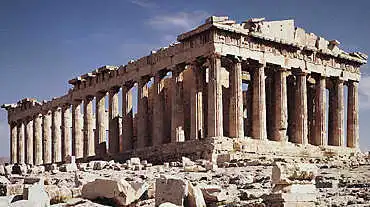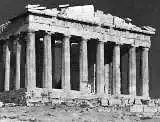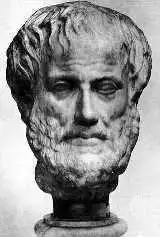Cosmos of the Ancients The Greek Philosophers on Myth and CosmologyMelissus elissus (flourished circa 442 BC) was the student of Parmenides, but also in contact with Heraclitus — that would have been in his early youth, since their flourishing differs some 60 years. To Parmenides, the difference was a little more than 30 years. Melissus wrote one book, the title of which is referred to with different titles in antiquity, one being Concerning Nature or What Is.
elissus (flourished circa 442 BC) was the student of Parmenides, but also in contact with Heraclitus — that would have been in his early youth, since their flourishing differs some 60 years. To Parmenides, the difference was a little more than 30 years. Melissus wrote one book, the title of which is referred to with different titles in antiquity, one being Concerning Nature or What Is.
According to Diogenes Laertius, Melissus said that: "we ought not to make any statements about the gods, for it was impossible to have knowledge of them." Melissus regarded the universe as unlimited and forever the same, also uniform and completely full of matter. Any change or motion was only apparent, not real. Simplicius, who contains all ten Melissus fragments remaining, quotes him saying: That which was, was always and always will be. For if it had come into being, it necessarily follows that before it came into being, Nothing existed. If however Nothing existed, in no way could anything come into being out of nothing. By the same method of reasoning he concludes that the world is one, uniform and unlimited, cannot move and cannot change. Thereby, he would necessarily refuse to accept the cosmogony given in Hesiod, and a portrayal of gods mighty enough to cause genuine change to the world — to add things to it or take things away from it, to disturb its uniformity or set it in motion. With such limitations, there would not be much divine remaining for the gods, and indeed he makes no reference at all to them in his cosmology. Therefore, in stating that it is impossible to have any knowledge of the gods, Melissus may have masked a total disbelief in them behind this somewhat diplomatic thesis, very similar to what had been stated by Protagoras — of the same age as him — in the year 411 BC. There were limits to the tolerance of Greek society, and they could be dangerous indeed to exceed.
LiteratureDiogenes Laertius, Lives of Eminent Philosophers, translated by R. D. Hicks, volume II, Loeb, London 1950.Barnes, Jonathan, The Presocratic Philosophers, volume 1, London 1979. Freeman, Kathleen, Ancilla to The Pre-Socratic Philosophers, Oxford 1952.
© Stefan Stenudd 2000

The Greek Philosophers
AristotleIntroductionAristotle's LifeTimelineAristotle's PoeticsAristotle's CosmologyAbout CookiesMy Other WebsitesCREATION MYTHSMyths in general and myths of creation in particular.
TAOISMThe wisdom of Taoism and the Tao Te Ching, its ancient source.
LIFE ENERGYAn encyclopedia of life energy concepts around the world.
QI ENERGY EXERCISESQi (also spelled chi or ki) explained, with exercises to increase it.
I CHINGThe ancient Chinese system of divination and free online reading.
TAROTTarot card meanings in divination and a free online spread.
ASTROLOGYThe complete horoscope chart and how to read it.
MY AMAZON PAGE
MY YOUTUBE AIKIDO
MY YOUTUBE ART
MY FACEBOOK
MY INSTAGRAM
MY TWITTER
STENUDD PÅ SVENSKA
|
 Cosmos of the Ancients
Cosmos of the Ancients